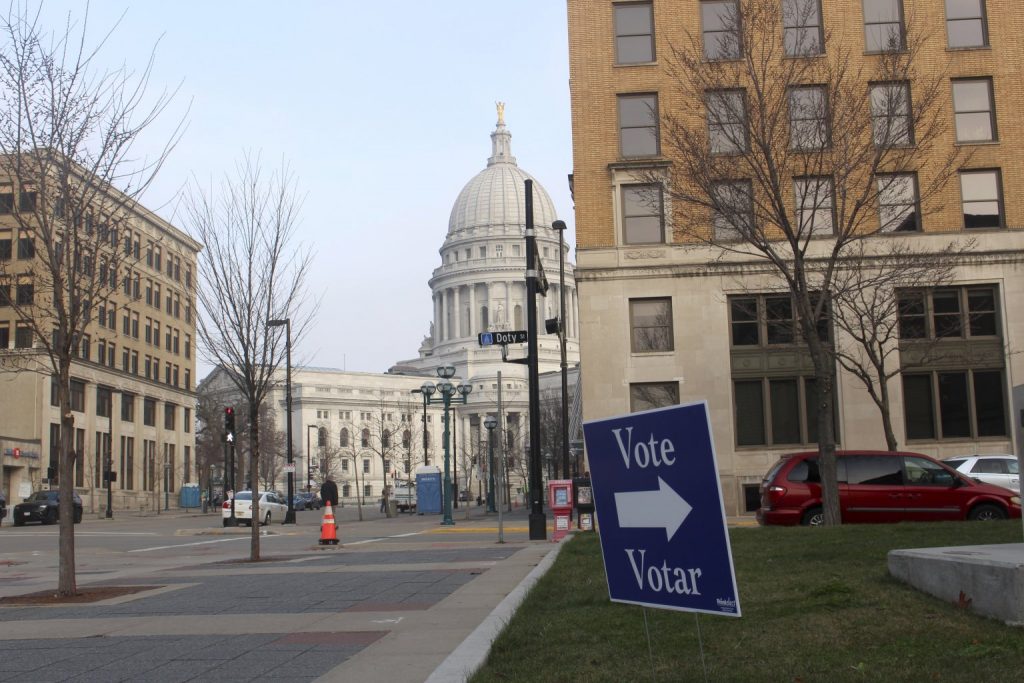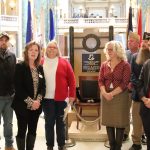Top GOP Legislator Pushes Plan to Find Non-Citizens on Voter Rolls
Experts say its illegal and could result in legal voters being taken off the rolls.
Speaking to a group founded by a leading election denier, a top Wisconsin lawmaker on Thursday laid out an ambitious plan to identify non-citizens on the voter rolls and have them removed just weeks before this fall’s election in the pivotal swing state.
Election experts say the approach described by Rep. Scott Krug (R-Nekoosa) is likely illegal, and, if implemented, could well cause eligible voters to be taken off the rolls. They add that there’s no evidence of non-citizens voting in significant numbers.
Krug said that in September, he’ll take his research to every municipal clerk in the state — there are 333 — and urge them to remove the non-citizens.
“I think this is probably the most important project we can do in the state of Wisconsin to reinstall confidence in just making sure that our voter rolls are clean,” Krug said. “It shouldn’t be that complicated.”
Krug was speaking at a June 13 online meeting organized by the Election Integrity Network, which was founded by the former Donald Trump lawyer Cleta Mitchell and works to mobilize grassroots activists across the country to hunt for illegal voting.
Mitchell played a key role in Trump’s failed bid to overturn the results of the 2020 election.
“Republicans have been all too happy over a period of many years now to disenfranchise voters at every opportunity,” said Rep. Lisa Subeck, a Democrat on the Campaigns and Elections Committee. “The net result is eligible voters will find it harder if not impossible to cast their ballots on Election Day.”
“I think going into the next election, there are certainly legislators who want to have another 2020 on their hands,” she said. “What I fear is that Republicans like Scott Krug and others are laying the groundwork for another January 6. And that’s horrifying.”
538.com’s prediction model shows Wisconsin as tied with Arizona and Pennsylvania for the most competitive state in this year’s presidential election. In 2020, President Joe Biden won the state by fewer than 21,000 votes.
Krug acknowledged in the meeting that he currently has neither of the lists needed for the project. But he said the state’s Legislative Technology Services Bureau agreed to provide his office with the statewide voter list, after the state elections agency, the Wisconsin Election Commission, was uncooperative. And, he added, the state motor vehicles department was expected to give him the list of legal non-citizens with drivers licenses.
A message left with the LTSB was not immediately returned.
Krug was vague about how the crucial and complex process of comparing the two lists would be done.
“We’re going to have to employ some data comparison,” he said. “We’re going to have to engage with some folks who are able to do that, because I don’t think LTSD is gonna be able to handle that project on their own. So we’re looking for people who can do that comparison.”
“The goal is, by September, to take this comparison and list and give it to every municipal clerk in the state of Wisconsin,” Krug continued, “and say, this is exactly how many people actually voted using this process that shouldn’t have voted, and who are technically still on your voter list — please remove them from your voter list.”
The September deadline, Krug said, would give clerks several weeks before the start of early voting to contact voters “to require better proof,” or to “just remove them flat-out if they don’t have proof.”=
“There are going to be some clerks in the state of Wisconsin who are probably going to refuse to remove individuals from their voter rolls,” Krug acknowledged.
Clerks would have good reason to refuse, election experts say. For one thing, according to David Becker, the founder and executive director of the Center for Election Innovation and Research, and a leading election administration expert, there are privacy concerns.
“This legislator is talking about sharing highly protected, highly sensitive and private personal information from motor vehicles records with unspecified third parties,” said Becker. “The legality of this is highly questionable. But, as importantly, I think the public would have a right to know exactly who will have access to this data, how it will be stored, and how it will be used.”
Privacy aside, Becker said, the process Krug describes is likely to lead to significant numbers of eligible voters being wrongly removed from the rolls.
When other states have tried to do similar comparisons, Becker explained, they’ve found that many of the people on the list of legal non-citizens with drivers licenses will likely have become citizens some time after getting their license.
“It’s really targeting naturalized citizens, who for a variety of reasons are among the most patriotic and excited to participate in our democracy,” said Becker.
“These kinds of things happen all the time, and unless you’re an extremely sophisticated data scientist, working with sophisticated software, you’re going to result in a lot of false positives,” said Becker. “You’re going to overestimate the number of non-citizens. And that’s obviously a big problem.”
Becker is the founder of the Electronic Registration Information Center, a widely respected data-sharing compact of which Wisconsin is a member. Though several GOP-led states have pulled out of the pact in recent years, portraying it as a scheme to boost Democrats, election officials of both parties have said ERIC’s data has helped them keep their rolls clean without removing eligible voters, and while protecting voter privacy.
A spokesman for the WEC, which runs the state’s elections, did not immediately respond to a request for comment on Krug’s plan.
Krug’s focus on non-citizen voting is in sync with that of the national GOP, which recently introduced legislation on the issue.
Announcing the measure, Speaker Mike Johnson said he knows “intuitively” that large numbers of non-citizens vote in federal elections. In fact, an exhaustive 2017 study by the Brennan Center found just 30 incidents of suspected — not proven — non-citizen voting out of 23.5 million votes cast in the 2016 election, or just 0.0001 percent.
During his tenure as chair of the Campaigns and Elections Committee, Krug has built a reputation for being relatively conciliatory and bipartisan.
But he described his plan as an attempt to go around Wisconsin Gov. Tony Evers, a Democrat, who last year vetoed a GOP-backed bill that aimed to crack down on voting by non-citizens.
“We don’t need the governor’s approval to get people off the voter rolls if somebody’s not allowed to be on the voter rolls,” Krug said.
And he struck an intensely partisan note as he explained the need to go it alone.
“We’ve got the legislature, but we don’t have the governor,” Krug added. “And last year we lost our Supreme Court to the new liberal majority. So I’ve got one lever of power that I get to pull, out of these three. So to even get as far as we’re able to get today is a monumental victory.”
Top Wisconsin lawmaker has new plan to find non-citizens on voter rolls was originally published by Wisconsin Examiner.























Again the Republicans begin their approach on the premise that election integrity in Wisconsin is flawed, rigged, and improperly managed. They only seem to get this riled up when they sense another election loss coming, so…